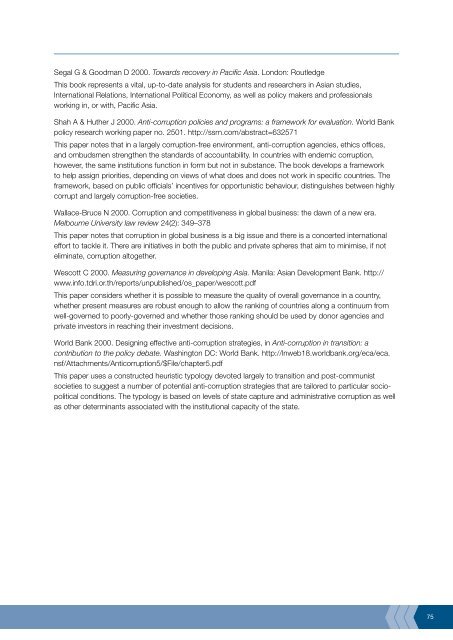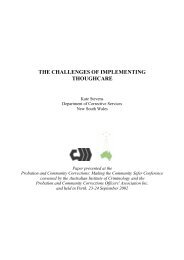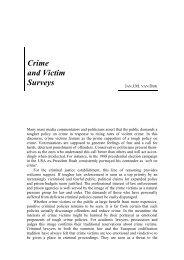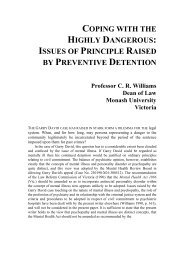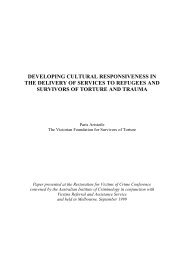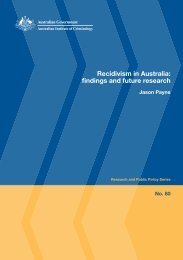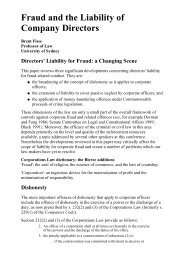Review of anti-corruption strategies Rob McCusker - Australian ...
Review of anti-corruption strategies Rob McCusker - Australian ...
Review of anti-corruption strategies Rob McCusker - Australian ...
You also want an ePaper? Increase the reach of your titles
YUMPU automatically turns print PDFs into web optimized ePapers that Google loves.
Segal G & Goodman D 2000. Towards recovery in Pacific Asia. London: Routledge<br />
This book represents a vital, up-to-date analysis for students and researchers in Asian studies,<br />
International Relations, International Political Economy, as well as policy makers and pr<strong>of</strong>essionals<br />
working in, or with, Pacific Asia.<br />
Shah A & Huther J 2000. Anti-<strong>corruption</strong> policies and programs: a framework for evaluation. World Bank<br />
policy research working paper no. 2501. http://ssrn.com/abstract=632571<br />
This paper notes that in a largely <strong>corruption</strong>-free environment, <strong>anti</strong>-<strong>corruption</strong> agencies, ethics <strong>of</strong>fices,<br />
and ombudsmen strengthen the standards <strong>of</strong> accountability. In countries with endemic <strong>corruption</strong>,<br />
however, the same institutions function in form but not in substance. The book develops a framework<br />
to help assign priorities, depending on views <strong>of</strong> what does and does not work in specific countries. The<br />
framework, based on public <strong>of</strong>ficials’ incentives for opportunistic behaviour, distinguishes between highly<br />
corrupt and largely <strong>corruption</strong>-free societies.<br />
Wallace-Bruce N 2000. Corruption and competitiveness in global business: the dawn <strong>of</strong> a new era.<br />
Melbourne University law review 24(2): 349–378<br />
This paper notes that <strong>corruption</strong> in global business is a big issue and there is a concerted international<br />
effort to tackle it. There are initiatives in both the public and private spheres that aim to minimise, if not<br />
eliminate, <strong>corruption</strong> altogether.<br />
Wescott C 2000. Measuring governance in developing Asia. Manila: Asian Development Bank. http://<br />
www.info.tdri.or.th/reports/unpublished/os_paper/wescott.pdf<br />
This paper considers whether it is possible to measure the quality <strong>of</strong> overall governance in a country,<br />
whether present measures are robust enough to allow the ranking <strong>of</strong> countries along a continuum from<br />
well-governed to poorly-governed and whether those ranking should be used by donor agencies and<br />
private investors in reaching their investment decisions.<br />
World Bank 2000. Designing effective <strong>anti</strong>-<strong>corruption</strong> <strong>strategies</strong>, in Anti-<strong>corruption</strong> in transition: a<br />
contribution to the policy debate. Washington DC: World Bank. http://lnweb18.worldbank.org/eca/eca.<br />
nsf/Attachments/Anti<strong>corruption</strong>5/$File/chapter5.pdf<br />
This paper uses a constructed heuristic typology devoted largely to transition and post-communist<br />
societies to suggest a number <strong>of</strong> potential <strong>anti</strong>-<strong>corruption</strong> <strong>strategies</strong> that are tailored to particular sociopolitical<br />
conditions. The typology is based on levels <strong>of</strong> state capture and administrative <strong>corruption</strong> as well<br />
as other determinants associated with the institutional capacity <strong>of</strong> the state.


